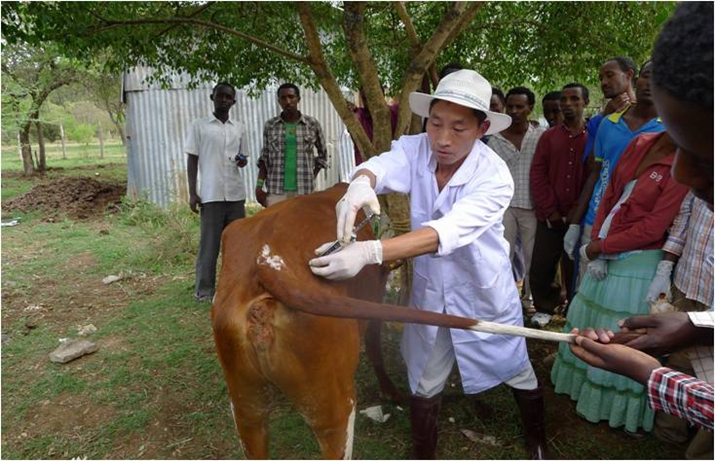|
|||||||||||
|
|
| The Healing Touch |
| Chinese veterinarians share their expertise to improve farming in Ethiopia |
| By Zheng Yang | VOL. 8 March 2016 |
 |
| Hu Zuobin giving a practical demonstration to Ethiopian students |
At the Alage Agricultural Technical Vocational Education Training College south of Addis Ababa, Hu Zuobin, a senior veterinarian from southwest China's Sichuan Province, was giving a practical demonstration to Ethiopian students from the veterinary medicine department.
As Hu approached a cow, an alarmed student shouted a warning: "Don't touch her. It is dangerous."
"You are right, it is dangerous," Hu replied. "But once you learn how to work with an animal, the danger will recede." Hu realized that the Ethiopian veterinary teachers had not received enough practical training when they were in school themselves. So they were not experienced enough to give demonstrations to their students. As a result, the students, who would become vets one day, didn't feel comfortable touching real animals.?
Hu told himself that would be the first problem he would fix for the Ethiopian college.
Problem solver
In 2009, 45-year-old Hu first went to Ethiopia as part of an agricultural education cooperation program between China and Ethiopia organized by the Chinese Ministry of Agriculture. His job was to teach veterinary clinical diagnosis in the local college funded by Ethiopia's Ministry of Agriculture.
The role as college teacher was different from his previous working experience in Africa. Between 2004 and 2006, Hu had provided technical assistance in poultry farming at a Nigerian farm through a UN Food and Agriculture Organization program. Despite the different roles, he felt his mission as a Chinese expert remained the same - to work on solutions to real problems.
In Ethiopia in 2013, he found out the reason for the low production of the college poultry farm and managed to increase the egg laying rate to 60 percent from the earlier 20 percent. In 2015, resolved to address the widespread tick problem in Ethiopia, Hu experimented with an anti-tick medicine for cattle and sheep with the help of local teachers and came up with an effective dose to combat it.
"We [Chinese teachers] observed and analyzed the college's needs and problems so that we could address them," Hu said. "That's how we built trust."
In fact, the trust was built at the very beginning. Hu's efforts to introduce practical training in class were lauded by both the students and college administrators. The latter asked him to train the entire faculty as well to improve their practical ability.
Hu and his other Chinese colleague accepted the task. They designed a four-month training program for nearly 60 Ethiopian teachers. The program included 10 important clinical skills such as giving intravenous transfusions and taking blood samples.
The improvements Hu and his team made in the college were appreciated by Solomon Tesgaye, head of the department. "We need your help further. Please do come back,?he told Hu when Hu left for China after finishing his term in mid-2012.
The wish was fulfilled. In November 2012, Hu returned to the college. He had taught nearly 1,200 students and 200 teachers before finally leaving in 2015.
Pioneering feats
Hu's training program for teachers was unprecedented in both scale and impact in the history of China-Ethiopia cooperation in vocational education. And it was just one of the many "firsts" he performed at the college.
In 2014, Hu helped the college set up a veterinary clinic, the first in the country that could both serve local farmers and be a practice base for students. The same year, he organized a visit by the Chinese Chongqing Fangtong Animal Pharmaceutical Co. The company's representatives gave lectures for the benefit of students, teachers and animal farm technicians, developing a new cooperation model between the company and the Ethiopian college.
Hu also led a group of five Ethiopian teachers in compiling a 300,000-word veterinary textbook in English in 2015.
"Ethiopians trust and respect Chinese teachers," he said, commenting on his years in the Horn of Africa country. "But to deserve that respect, Chinese teachers have to be dedicated and make creative contributions." Though Hu's stint in the Alage college came to an end in July 2015, he returned to Ethiopia four months later. It has been the start of a new chapter in his career, this time at the Agarfa Agriculture Technical Vocational Education and Training College, located nearly 500 km away from the capital city.
|
||||||||||||
|
|||
| Copyright ChinAfrica All right reserved 京ICP备08005356号 |